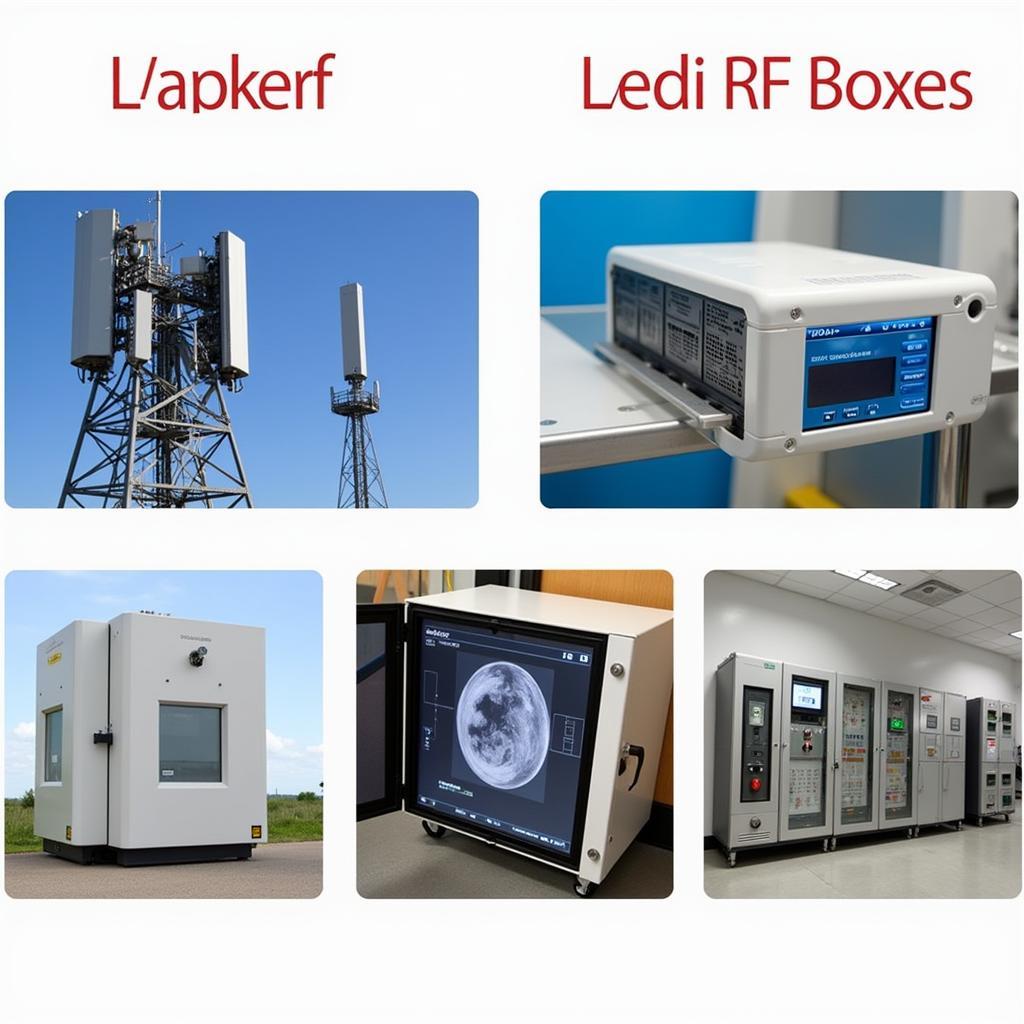Understanding the RF Box: A Comprehensive Guide
December 4, 2024Rf Boxes, also known as radio frequency boxes, are becoming increasingly prevalent in various applications, from consumer electronics to industrial automation. Whether you’re a tech enthusiast or simply curious about this technology, this article will provide you with a deep understanding of what an RF box is, how it works, and its diverse range of uses. We’ll explore the core principles behind RF technology and its impact on our everyday lives.
What is an RF Box?
An RF box is essentially an enclosure designed to house and protect electronic circuits that operate within the radio frequency spectrum. These boxes are crucial for preventing electromagnetic interference (EMI), which can disrupt the performance of sensitive electronic equipment. The RF box acts as a shield, blocking unwanted radio waves from entering or exiting the enclosure.
How Does an RF Box Work?
The functionality of an RF box revolves around the principle of electromagnetic shielding. The metallic enclosure of the box acts as a barrier, preventing external RF signals from interfering with the internal circuitry. Conversely, it also stops the internal RF signals from leaking out and causing interference with other devices. This shielding is achieved through the use of conductive materials, which effectively reflect and absorb RF energy. Think of it like a Faraday cage, creating a secure environment for your sensitive electronics.
Different Types of RF Boxes
There are various types of RF boxes designed for specific applications. These include:
- Shielded Enclosures: These are general-purpose RF boxes used for a wide range of applications, offering basic EMI protection.
- Filtered Boxes: These boxes incorporate filters to selectively block specific frequencies, allowing desired signals to pass through while attenuating unwanted interference. This type of box is ideal for applications where precise frequency control is essential.
- RF Test Enclosures: Designed for testing electronic devices in a controlled RF environment, these boxes offer high levels of shielding and often include features for connecting test equipment.
 Various Applications of RF Boxes
Various Applications of RF Boxes
Why are RF Boxes Important?
RF boxes play a critical role in maintaining the integrity and reliability of electronic systems. In a world increasingly reliant on wireless communication, the potential for RF interference is constantly growing. Without proper shielding, sensitive electronics can malfunction, leading to data corruption, performance degradation, and even safety hazards. A personalized plastic pencil box may not seem directly related to this technology, but it exemplifies the concept of containing and protecting valuable items, much like how an RF box protects sensitive electronics. For a more distinct example, consider a baseball shadowbox, which preserves a cherished memory. Similar to this, RF boxes preserve the function and integrity of electronics, shielding them from harm.
Common Applications of RF Boxes
RF boxes find applications in various industries and everyday devices, such as:
- Telecommunications: RF boxes are essential components in base stations, antennas, and other wireless communication equipment.
- Medical Devices: Shielding is critical in medical imaging equipment and other sensitive medical devices to ensure accurate and reliable operation.
- Industrial Automation: RF boxes protect industrial control systems from interference, preventing malfunctions that could disrupt critical processes.
- Consumer Electronics: Even devices like smartphones and laptops utilize RF shielding to prevent interference and ensure optimal performance.
Choosing the Right RF Box
Selecting the right RF box requires careful consideration of several factors:
- Frequency Range: The box should be designed to effectively shield against the specific frequencies used by the application.
- Shielding Effectiveness: The level of shielding required depends on the sensitivity of the equipment and the intensity of the surrounding RF environment. Consider checking options for a used ticket booth for sale, though unlikely to be related, it demonstrates the principle of selecting the right enclosure for specific needs.
- Size and Form Factor: The dimensions of the box should accommodate the internal components while also fitting within the overall system design. A mother’s day music box, while unrelated, offers another perspective on the importance of selecting the right size and design for specific purposes.
Conclusion
RF boxes are essential components in modern electronics, providing vital protection against electromagnetic interference. Understanding their function and applications is crucial for anyone working with RF technology. From ensuring the reliability of critical infrastructure to protecting sensitive medical equipment, RF boxes play a crucial role in our increasingly connected world. Finding the right RF box is a crucial step in ensuring the smooth operation and longevity of your electronic systems. If you’re searching for unique experiences, an after-hours boom box room could be an intriguing option, but remember to prioritize choosing the right RF box for your needs.
FAQs
- What is EMI?
EMI stands for electromagnetic interference, which is the disruption of the operation of an electronic device when it is in the vicinity of an electromagnetic field caused by another electronic device. - What materials are RF boxes made of?
RF boxes are typically made of conductive materials like aluminum, steel, or copper. - How do I choose the right RF box for my application?
Consider the frequency range, shielding effectiveness, and size requirements. - What are the benefits of using an RF box?
RF boxes protect sensitive electronics from interference, ensuring reliable operation. - Are RF boxes only used in industrial applications?
No, RF boxes are used in various applications, including consumer electronics and medical devices. - What is the difference between a shielded enclosure and a filtered box?
Filtered boxes incorporate filters to selectively block specific frequencies. - Where can I buy an RF box?
RF boxes can be purchased from electronics distributors and manufacturers.
For further support, please contact us at Phone Number: 0963418788, Email: [email protected] Or visit our address: 2M4H+PMH, Phường Nghĩa Thành, Gia Nghĩa, Đắk Nông, Việt Nam. We have a 24/7 customer service team.